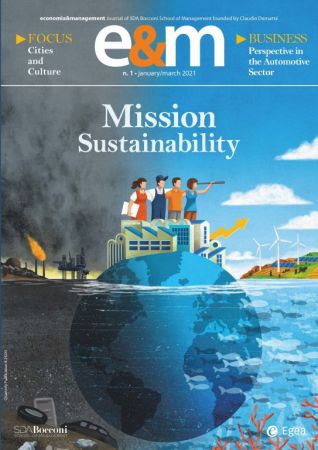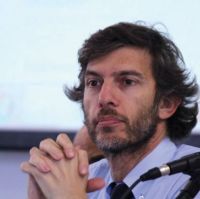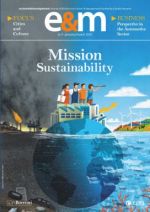E&M
2021/1
Sustainability at the Center of Business
The goal of this Dossier is to assess the situation regarding sustainability, thus offering the contribution of the SDA Bocconi School of Management and its Sustainability Lab to the debate on the subject.
It was the end of 2019 when Greta Thunberg, the young Swedish activist who travelled the world and awoke the conscience of thousands of youth on the question of climate, was named "Person of the Year" by TIME magazine, receiving the honor of the cover and the attention of political leaders, top managers, and entrepreneurs. In the same period, the European Union approved the Green Deal, the imposing Action Plan that, through the allocation of approximately one trillion euros over the span of a decade, has the goal of transforming the climate and environmental challenge into an opportunity, guaranteeing the development of a fairer, more prosperous society, based on a modern and competitive economy. At the start of 2020, sustainability was also discussed considerably at the World Economic Forum in Davos – the global summit on economics and markets – where climate phenomena was the focus of multiple meetings, together with the circular economy, the energy transition, and major social challenges.
To summarize, homo oeconomicus finally seemed to have recognized his responsibilities towards the planet, driven by growing scientific evidence and the pressure from that part of society most attentive to the future and the resilience of our ecosystems: youth. Then, between February and March 2020, the world was struck by the violence of the Covid-19 pandemic, whose sudden arrival completely disrupted our lives. In those initial months of fear and confusion, when we were trying to figure out how to face the health, economic, and social emergency, according to various critics of sustainability we should have returned to "concrete things," to "the business of business is business" from Friedman's time, focusing on established industrial activities, setting aside the requests from Greta and the youthful dreams of a more sustainable and fair world.
Today, while we are still battling the virus, we can look at the annus horribilis that has just passed with the knowledge that at least something positive happened, an element that will have important effects on our prosperity, our wellbeing, and our future. We are talking precisely about sustainability. Whether it is the implementation of the public measures necessary to reach the goals of the United Nations 2030 Agenda, or the allocation of private resources, unlike what the skeptics, cynics, and deniers of global warming believed, 2020 has consolidated the idea of sustainability as the only possible path for the future. It is a mandatory starting point to try to overcome the enormous wounds generated by the coronavirus, but also an opportunity to rebuild our equilibrium between economics, society, and the planet.
After years of substantial indifference on the part of managers, entrepreneurs, and the academic community, today the challenge of the climate, the scarcity of energy resources, human rights, gender equality, and the question of inequality have become central issues in the agendas of companies, banks, investors, and business schools. It seems that the pandemic has contributed to accelerating some processes that began in the past decade; above all, a dynamic of consumption that is more attentive to the products of companies that have a social and environmental purpose, the request for transparency and traceability of companies' operations, the development of forms of non-financial reporting, and investor attention to Environmental, Social and Governance-ESG risks and social impact. Furthermore, after the great disengagement on environmental issues by his predecessor, the recent victory of Joe Biden in the U.S. elections has revived the question of the fight against climate change and for sustainability, with the idea that these challenges can finally become the common pillar of the international political and economic agenda in the coming decade.





